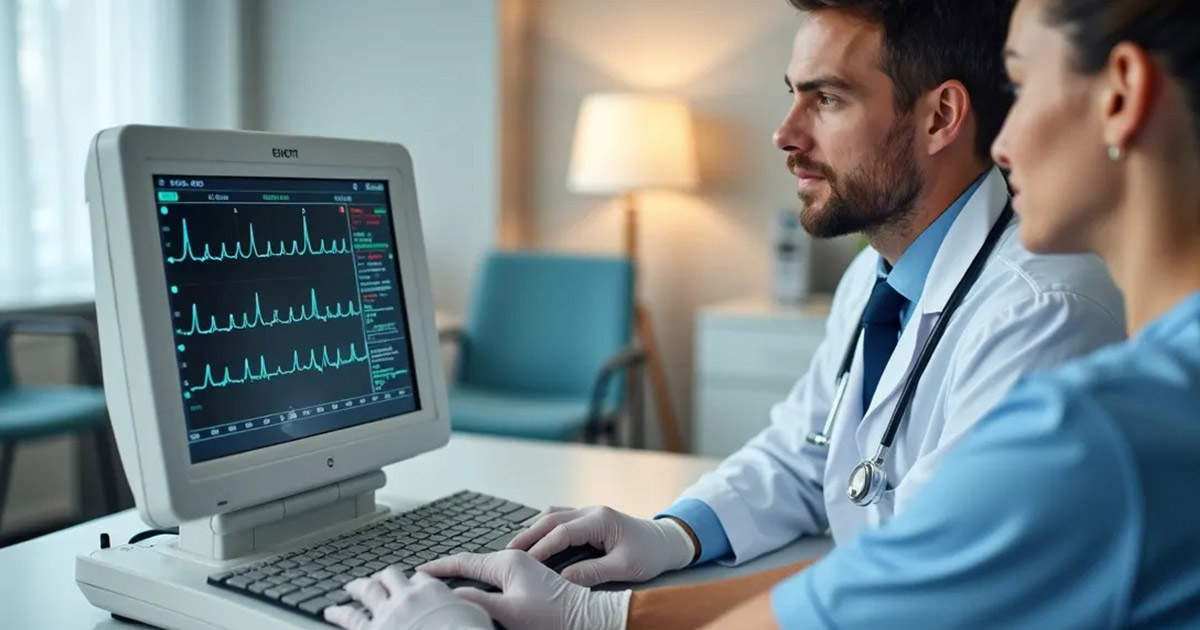
Bachelor of Science ECG Technician
By NCTA Team Last Updated: December 30, 2025Overview:
ECG, or electrocardiogram, is a medical test that measures the electrical activity of the heart over a period of time. It provides information about the heart's rhythm, the size and position of the heart chambers, and the presence of any damage to the heart muscle. An ECG is a crucial tool in cardiology and is widely used for both diagnostic and monitoring purposes in patients with heart conditions.
Bachelor of Science in ECG Technician program is designed to equip students with comprehensive knowledge and practical skills in electrocardiography. This three-year course combines theoretical instruction with hands-on training, preparing graduates for a rewarding career in cardiovascular diagnostics and patient care. The Bachelor of Science in ECG Technician program is an ideal choice for individuals seeking to advance their careers in cardiovascular diagnostics.
What is ECG?
ECG is a valuable, non-invasive tool for assessing heart health by measuring the electrical activity of the heart. The results can guide diagnosis and treatment for various cardiovascular conditions. Here’s a detailed breakdown of how the process works:
Electrical Activity of the Heart
- The heart has its own electrical system that regulates heartbeat. The electrical impulses originate from the sinoatrial (SA) node, located in the right atrium.
- These impulses spread through the atria, causing them to contract and push blood into the ventricles.
- The impulses then reach the atrioventricular (AV) node, which delays the signal slightly before it travels through the bundle of His and into the Purkinje fibers, causing the ventricles to contract and pump blood to the lungs and the rest of the body.
Placement of Electrodes
- To perform an ECG, electrodes are placed on the skin at specific locations, typically on the chest, arms, and legs. A standard 12-lead ECG uses ten electrodes to produce twelve different views of the heart’s electrical activity.
- The typical electrode placement includes:
- Six chest leads (V1-V6) positioned around the heart.
- Four limb leads (I, II, III, aVR, aVL, aVF) that measure the electrical activity in different directions.
Recording Electrical Signals
- As the heart beats, the electrical impulses generated by the heart travel through the body fluids, which conduct electricity.
- The electrodes detect these electrical signals and send them to the ECG machine.
Generating the ECG Trace
- The ECG machine amplifies these electrical signals and records them on graph paper or a digital display.
- The resulting graph displays a series of waves and intervals that represent the heart's electrical activity over time.
- The key components of the ECG trace include:
- P Wave: Represents atrial depolarization (contraction of the atria).
- QRS Complex: Represents ventricular depolarization (contraction of the ventricles).
- T Wave: Represents ventricular repolarization (relaxation of the ventricles).
Interpreting the Results
- Healthcare professionals analyze the ECG trace for various parameters, including:
- Heart Rate: The number of beats per minute.
- Rhythm: Regularity of the heartbeats.
- Waveforms: Shape and size of the waves, which can indicate specific heart conditions (e.g., hypertrophy, ischemia).
- Intervals: The duration of the various segments and intervals, such as the PR interval and QT interval.
Clinical Use
- ECGs can help diagnose several conditions, including:
- Arrhythmias (irregular heartbeats)
- Myocardial infarction (heart attack)
- Heart failure
- Structural heart abnormalities
Roles of ECG Technicians:
An ECG technician is essential in performing ECG tests, ensuring patient comfort and safety, and supporting healthcare teams in diagnosing and monitoring cardiac conditions. Their skills contribute significantly to patient care, making them vital members of the medical community. Here’s an overview of their responsibilities and roles:
- Patient Interaction
- Equipment Management
- Electrode Placement
- Conducting the ECG
- Data Management
- Collaboration with Healthcare Team
- Quality Control
- Continued Education and Training
- Patient Education
Eligibility:
Candidates typically need to have completed their 12th grade with a focus on the Science stream, particularly with subjects like Biology, Physics, and Chemistry.
Course Curriculum:
Details for Bachelor of Science in ECG Technician include curriculum beside touching on an extensive variety of teaching objectives meant to both build theoretical knowledge as well as enhance practical prowess. Core subjects include:
- Human Anatomy and Physiology
- Fundamentals of Electrocardiography
- Cardiac Pathophysiology
- ECG Interpretation and Analysis
- Medical Electronics and Instrumentation
- Patient Care and Safety
- Clinical Practices and Rotations
Students will also practised clinical skills, using real patients and ECG equipment so that they can be in a position to work as soon as they complete their course.
Career Opportunities:
There is increasing employment opportunity for ECG Technicians because of increased demand for competent professionals in various health facilities. Graduates can find employment in:
- Cardiac Care Units (CCU)
- Intensive Care Units (ICU)
- Outpatient Departments (OPD)
- Hospitals
- Diagnostic Centres
- Cardiology Clinics
- Research Institutions
- Medical Equipment Companies
Health-care ECG Technicians should be ready to be paid between Rs. 15, 000/- Rs. 35, 000/- per month depending on the place they work for and the hospital they work at. After some years and addition of more expertise, the possibility of a better growth within the field or promotion to more senior positions and therefore better pay exists with growth into the cardiovascular area.
Course Features
| Course Code | UDC-632 |
| Duration | 3 Years |
| Category | Bachelor of Science ECG Technician |
| Eligibility | XII with Science from recognized board |
| Fees | 3×48000= 144000 |
To know more about our this course, feel free to call us at:
+91 9733600770Ready to Enroll in This Course?
Start your learning journey today and unlock your potential!
Apply Now for This Course
